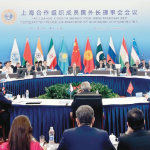The Afghanistan embassy has announced its permanent closure in New Delhi.
Releasing an official statement on the closure of its diplomatic mission in New Delhi, the Afghan embassy said, “Effective from November 23, 2023 owing to persistent challenges from the Indian government. The decision follows the embassy’s earlier cessation of operations on September 30, a move made in the hope that the Indian government stance will favourably change to let the mission operate normally.”
The embassy said it was ‘cognisant’ that some may attempt to characterise this move as an internal conflict, allegedly involving diplomats who switched allegiance to the Taliban, adding “that this decision is a result of broader changes in policy and interests”.
“To the Afghan citizens in India, the Embassy extends its sincere gratitude for their understanding and support throughout our mission’s tenure,” it added.
Despite “limitations in resources and power”, the Afghan embassy said it has worked “tirelessly for their betterment and in the absence of a legitimate government in Kabul”.
Over the past two years and three months, the Afghan community in India has witnessed a significant decline, with Afghan refugees, students, and traders leaving the country, the embassy noted in its statement, adding that the number has nearly halved since August 2021, with very limited new visas being issued during this period.
“We assure the Afghan community that the mission operated with transparency, accountability, and a commitment to fair treatment based on the goodwill and interests of Afghanistan considering historic ties and bilateral relations with India,” it added.
“Unfortunately, efforts have been made to tarnish our image and hinder diplomatic efforts in order to justify the presence and work of Taliban-appointed and affiliated diplomats. In the face of these challenges, our committed team worked diligently in the most difficult circumstances, prioritizing the interests of the 40 million Afghans in every possible sphere from securing humanitarian aid and online education scholarships to facilitating ease in trade and advocating for the formation of a broad-based government,” the Afghan embassy stated further in its statement.
It added that the Afghan embassy “exerted diplomatic pressure in its power on those who defy the will of the Afghan people by failing to form an inclusive government and denying millions of girls the right to attend school”.
As of now, there are no diplomats from the Afghan Republic in India. Those who served in the national capital have safely reached third countries, the embassy informed through its release, adding that the only individuals present in India are diplomats affiliated with the Taliban, visibly attending their regular online meetings.
“The diplomats of the Afghan Republic have handed over the mission solely to the Indian government. It now rests upon the Indian government to decide the fate of the mission, whether to maintain its closure or consider alternatives, including the possibility of handing it over to Taliban diplomats. The responsibility of diplomats appointed by the Islamic Republic of Afghanistan has officially come to an end. The unfortunate end of the Republic mission marks the conclusion of the Afghan Republic in India,” it added.
“We have considered the historic events and current circumstances carefully in arriving at this conclusion. We also extend our heartfelt gratitude to the people of India for their support and assistance to Afghanistan over the past 22 years. We reiterate our commitment to serving the people of Afghanistan and will continue to explore avenues to support our nation in these challenging times,” the statement concluded.
Notably, the Afghan embassy announced the closure of its operations on November 1, citing “lack of resources” and “failure to meet Afghanistan’s interests” by the Taliban regime.
The embassy also made an “unequivocal statement” stating that certain consulates that work on the instructions and funding from Kabul are not in consonance with the objectives of a legitimate or elected government but rather serve the interests of an “illegitimate regime”. (ANI)








